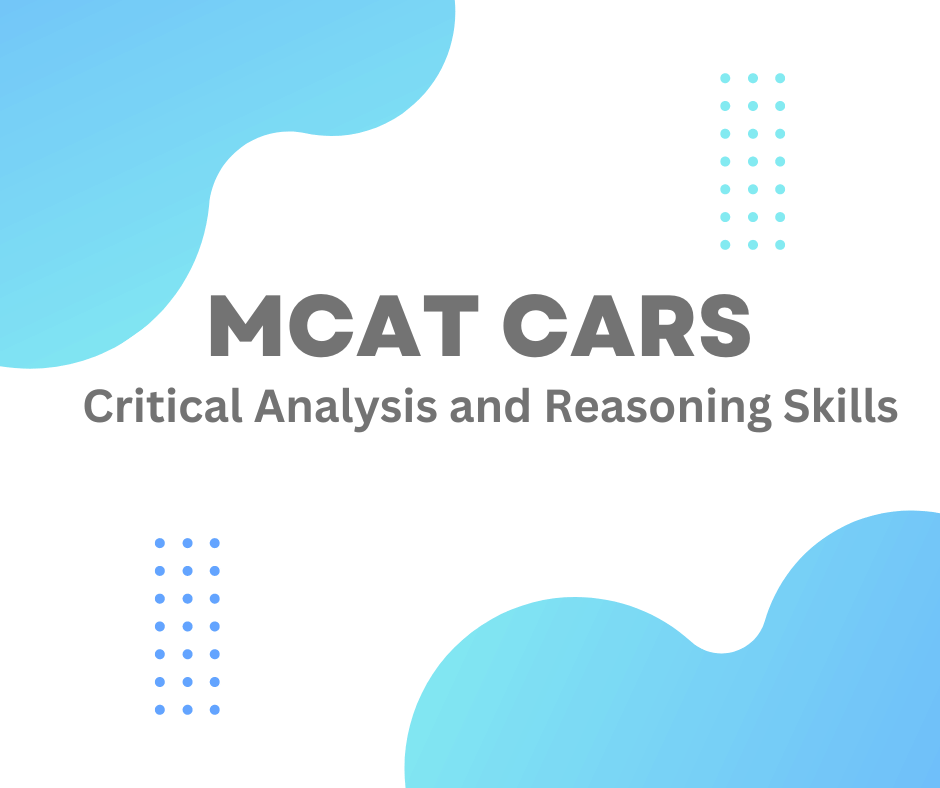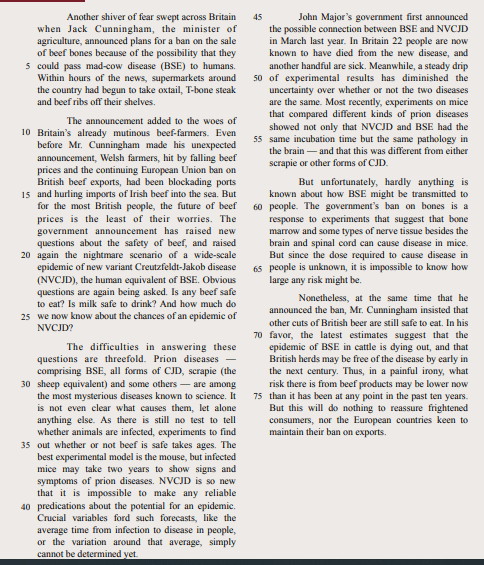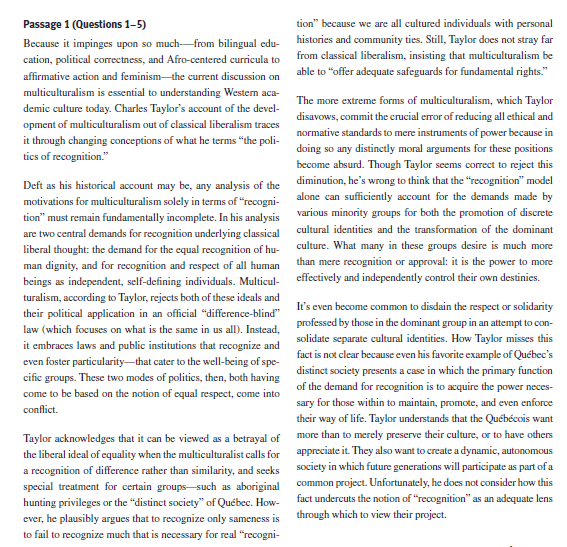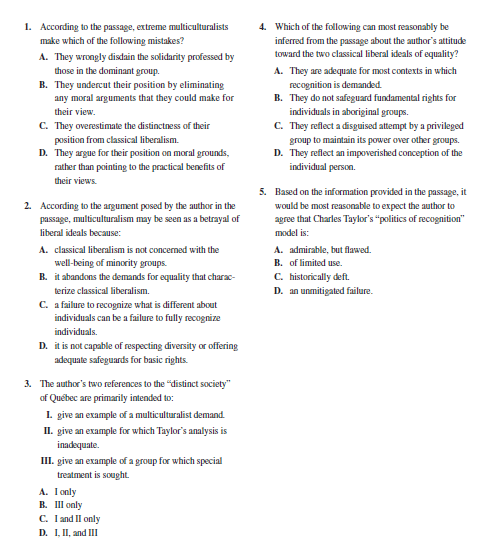

The Critical Analysis and Reasoning Skills (CARS) section is one of the four sections on the MCAT. It assesses your ability to read and interpret the information. The Association of American Medical Colleges (AAMC) has specially designed this section to evaluate the analysis and reasoning skills of the premeds that will help them comprehend and implement the knowledge they are going to acquire in their medical school.
The Medical College Admission Test (MCAT) is a hard nut to crack. You might underestimate the difficulty level of the MCAT CARS section but it is the most technical and the most difficult of all four sections of the test. Like other MCAT sections, the CARS section has no syllabus and it does not require any prior memorization of the subject matter, which makes this section even more challenging to prepare for. Therefore, many candidates are left racking their heads when they begin preparing for the CARS section.
You must work on your reading skills and your ability to interpret and critically analyze the information from what you read. Coming up with a strategy to enhance these skills can help you achieve a high CARS score. In this article, we will share different strategies that will help you ace the MCAT CARS section just like the other three sections.
What is on the MCAT CARS section?
Before discussing different strategies to ace the CARS section of the MCAT, let’s have a look at this section’s content. Overall, the MCAT has four sections i.e.,
- Biological and Biochemical Foundations of Living Systems
- Physical and Chemical Foundations of Biological Systems
- Psychological, Social, and Biological Foundations of Behavior
- Critical Analysis and Reasoning Skills (CARS)
As described earlier, the CARS section in the MCAT exam is hard and quite different from other sections. It includes 53 passage-based questions of around 500-600 words. According to AAMC, these passages from humanities and social sciences disciplines are extracted from journals, books, and magazines that premeds are likely to read. In addition, these passages can belong to a wide range of disciplines relating to Social Sciences and Humanities, such as:
| Architecture | Archaeology |
| Arts | Anthropology |
| Dance | Economics |
| Ethics | Education |
| Literature | Geography |
| Music | History |
| Philosophy | Linguistics |
| Popular Culture | Political Science |
| Religion | Population Health |
| Studies of Diverse Cultures | Sociology |
| Theatre | Psychology |
You have to read the passage, critically analyze the information given in it, and then answer the questions given at the end. The time allocated to this section is 90 minutes.1
What skills are tested on the MCAT CARS?
The critical analysis and reasoning skills section assesses three major skills on the MCAT. Therefore, three types of questions are asked in the CARS section of the MCAT.
- Foundations of comprehension
Some MCQs in the MCAT CARS section aim at testing your ability to understand the text’s basic components and comprehend rhetorical devices, text structure, and word choices. The AAMC provides detailed information regarding these skills on its website. Use this information to enhance these skills.
- Reasoning within the text
The questions that target testing this skill assess your ability to integrate different text components to increase comprehension. To attempt these questions, you must be proficient enough to analyze the author’s language and the passage’s plausibility and logic. In addition, you should learn to extract the main idea and biases from the topic and present your personal opinion against it.
- Reasoning beyond the text
The questions lying within this category test two sets of skills. One is to extrapolate the passage’s information or ideas to a new context whereas the second set of skills includes applying the new information presented in the text question to the passage’s context, and analyzing the impact of applying new ideas to the actual passage.
Strategies to ace the MCAT CARS Section
Now that you are well aware of the CARS section content and the skills tested on the MCAT CARS, you need to focus on some tips and tricks that will help you achieve a 118+ CARS score in this MCAT section.
To achieve a high score on the MCAT critical analysis and reasoning skills (CARS) section, you need to employ some strategies during your MCAT prep whereas other tips and tricks can be followed while attempting the MCAT CARS section.
Follow these tips while preparing for the CARS section of the MCAT.
- Determine your baseline score.
The foremost strategy to begin preparing for CARS is to determine your baseline score. “Baseline score” refers to the score you would achieve if you would have taken the test today.
When you start studying for MCAT 3-6 months before the actual test date, the first step toward your MCAT prep should be taking a full-length practice test. A self-assessment helps you evaluate your section-wise baseline score and also highlights your strengths and weaknesses. Therefore, we recommend taking a full-length practice test before starting your MCAT CARS prep. Once you have an idea of your baseline CARS score, you can mark the types of questions you need to practice. Then, you can allocate more time in your study hours to these questions.
Remember, CARS does not require any prior knowledge rather it is just a game of practice. The more you practice the skills tested in this section, the higher you can score.
In addition, instead of focusing merely on practice questions, practice reading, and question-answering skills in general. Read newspapers journals, articles, and books to enhance the aforementioned skills.
- Improve your active reading skills.
Active reading primarily focuses on comprehension. If you want to ace the MCAT CARS section, practice active reading as much as possible. It might involve taking notes and highlighting key ideas.
Enhanced active reading skills will help you comprehend the given passage in a better way and then manipulate the information within the passage to answer the test questions.
- Improve your reading skills.
The third skill to enhance while preparing for MCAT CARS is to learn reading quickly. The MCAT is 7.5 hours long out of which only 90 minutes are allotted to the CARS section. Only a quick reader can perform well in this section within the provided time limit. Therefore, practice reading the passages quickly.
However, do not read it too quickly that you fail to comprehend the content and understand the author’s tone.
- Practice CARS questions regularly.
The biggest mistake you can make during your MCAT prep is to leave the CARS section for the last moment. Although this section does not have any subject material, it still requires a lot of practice. So, incorporate CARS practice passages in your study schedule regularly. Practice them at least 2-3 times a week using the right resources. The most popular resources for solving CARS passages include:
- AAMC Practice tests
- BoardVitals
- Kaplan
- Princeton Review
- UWorld
Now we will discuss some strategies that will assist you in solving the CARS questions on your big day i.e., the test day. Let’s have a look at this worked example to understand the strategies for solving CARS questions in a better way.

- Make a passage outline.
Use your active reading skills to read the given CARS passage carefully and make a detailed outline of the passage. Also, note down the important information in each paragraph as key points. For instance, in the given passage, the author talks about the ban on the sale of beef bones in Great Britain due to the spread of mad-cow disease, you can jot it down as:
P1: – Ban on the sale of beef bones – Mad cow disease (BSE)
Similarly, in the second paragraph, the author talks about the European Union’s ban on beef exports, falling beef prices, and people being worried about the spread of the human equivalent of BSE i.e., the new variant Creutzfeldt-Jakob disease (NVCJD). This information can be summed up as follows:
P2: – Falling beef prices – EU ban on beef exports – Spread of NVCJD
– Safe consumption of milk and beef? – Chances of an NVCJD epidemic?
In the same way, note down the key information from all paragraphs.
P3: Prion diseases –
- Unknown causative agent
- No test for detecting infected animals or beef
- Best model: mice – symptoms appear in 2 years
- Impossibility to make reliable predictions about the epidemic
- Average infection to disease time in people – unknown
P4: – Same incubation time of NVCJD and BSE -Same pathology in the brain
- Different from other forms of CJD
P5: – experiments suggest bone marrow and some types of nerve tissue other than the brain and spinal cord can cause disease in mice
- Experiment results 🡪 government ban
- Infectious dose in humans??
P6: – other cuts of British beer 🡪 safe to consume
- BSE dying in cattle
- Nothing to reassure frightened customers
- European countries maintaining the ban on export
- Read the questions carefully.
After keenly reading the CARS passage and pulling out the key information, you should read the test questions carefully and go through the given options.
We recommend reading the questions first and then start reading the passage. It will help you understand what to read and comprehend from the CARS passage. This strategy will help you spend less time on reading the CARS passage. After reading the passage, reread the questions and choose the best option.
Take a moment to look at this worked example of CARS questions.

- Find textual evidence for the correct answer.
After reading the questions and all the provided alternatives carefully, choose the best possible answer. Cautiously, find the evidence from the passage content for your answer. For example, read question 4:
“The passage implies that Welsh framers “had been blocking ports and hurling imports of British beef into the sea” (lines 14-15) as:
- a reaction to the government’s recent announcement regarding the ban on certain cuts of beef
- a means of intercepting possibly infected beef before reaching the consumer
- an effort to underscore the impacts of the ban on Irish beef farmers
- a rebellious reaction to falling prices and bans on British beef”
Now, if you carefully read lines 10 to 15, you can see that the author has clearly stated that “Welsh farmers hit by falling beef prices and the continuing European Union ban on the British beef exports, had been blockading ports and hurling imports of Irish beef into the sea.”
These lines support the fact that the correct answer is “D.”
Similarly, if you consider question 2, i.e., “which of the following pieces of information would most likely aid researchers in predicting a potential NVCJD epidemic?,” lines 40-42 and 54-55 provide textual evidence for the correct answer “D.”
- Determine the passage’s main idea.
While solving CARS questions, it is important to figure out the passage’s main idea. It will help you in answering the questions appropriately. In addition, you might be directly asked the passage’s main idea just like question 5 in this worked example. As the passage is about the recent developments regarding NVCJD, the correct option is B.
- Figure out the types of questions.
Read the questions and try to understand the types of questions being asked i.e., whether they assess the foundations of comprehension, reasoning within the text, or reasoning beyond the text. Once you are familiar with the type of question, you can answer it in an even better way.
These tips and tricks will make the MCAT CARS section much easier for you. Now, solve the remaining questions using the discussed strategies and check them using this answer key:
| 1 | 2 | 3 | 4 | 5 | 6 | 7 |
| C | D | A | D | B | B | C |
MCAT CARS Practice Passages
Consider another example to practice for the CARS section of the MCAT.2

Before reading the passage carefully, read these questions carefully.

Now, following the strategies mentioned above, note down the key points within the passage and create a detailed outline. Then use your skills to comprehend the given information, interpret it, and use it to answer the test questions.
Use the following key to check your answers.
| 1 | 2 | 3 | 4 | 5 |
| B | B | D | D | B |
Conclusion
Achieving a good MCAT score is requisite to get into your dream med school. The medical schools not only test your overall MCAT score but your section-wise score as well. The CARS section of the MCAT is the hardest of all four MCAT sections as you do not have any subject material to prepare for it. This section does not require any prior knowledge rather it assesses your critical reading skills, the ability of comprehension, and critical analysis skills. To achieve a 118-132 score on the MCAT CARS, enhance these skills and practice active reading. Lastly, the key to success for this section is to practice, practice, and practice.
Keep practicing, work hard, and follow these tips to conquer the MCAT CARS section.
References
1. What’s on the MCAT Exam? Critical Analysis and Reasoning Skills. Accessed February 16, 2023.
https://students-residents.aamc.org/media/8731/download 2. Macnow, A, S. MCAT Critical Analysis and Reasoning Skills Review. 2nd Edition. Kaplan; 2015: 84-91.




